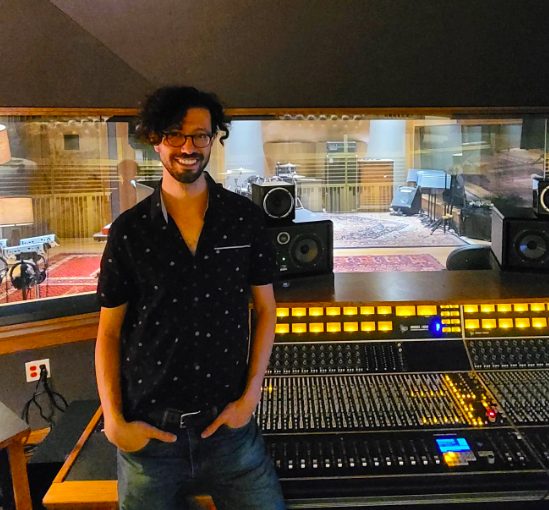Audio Engineer Q&A with Producer Evan Kornblum


You can just FEEL the enormous passion for music that Stages Audio Engineer and Record Producer Evan Kornblum brings to his work when you speak with him about his journey to becoming an engineer & producer. Go inside his experience with this Q&A and learn what makes him tick, how he approaches his work and his own personal musical journey. Click here to book a session with Evan!
My musical journey started with classical piano lessons at age 5. I bought my first microphone at 16 to figure out how to record myself playing piano, guitar, and drums. I quickly realized I would need more than one mic to make it sound good! When I was 19, other artists started asking me to help record their music – usually in dorm rooms at college. From there, I got my first staff engineer job at age 21 and worked in numerous studios before coming to Stages in 2017. What I love most about recording is helping people put the pieces together and seeing their reactions to the final result; that I get to use my creative skills as a musician and multi-instrumentalist; and that no two days are alike.
A common misconception I hear is “if my song is three minutes long, why do I need more than three minutes of studio time?” Here’s why: it takes time to set up instruments, microphones, get audio levels, and make sure the artist has a good headphone mix coming back to their ears. The artist will do multiple takes of the music and listen back between each take. Conversations between band members and producers will be had to discuss directions for the next take, such as dynamics, arrangement, or choice of snare drum. Instruments have to be tuned between each take. It does take some time, but it’s always worth it.
Feel is absolutely more important and there’s no software fix for a recording with no feel. Sounds and tones can always be adjusted. Sometimes, an element from a demo recording makes it to the final mix. We can use tools like equalization, or EQ, to make improvements to the sound so it fits with the other elements in the recording. That said, if an artist has an opportunity to go into the studio to record with an engineer, you can be sure that you’ll end up with a recording that has both feel and sound.
I love indie rock, 90s alt, metal, folk, singer/songwriter, country – basically anything that has drums, guitars, and vocals.
Absolutely! I play guitar, bass, drum set, and keys. Playing instruments is one of my favorite things. I even majored in classical performance in college. I still play in bands; in fact, there’s never been a time I haven’t been in at least one band. I currently play keys for Amazing Destroyer.
There are many kinds of engineers who don’t play music. Some people create sound effects, record voiceover, or mix for film/TV. If you want to work with musicians, then yes, you should be well-trained in music and play at least one instrument. You want to be able to “speak the language.”
I love when an artist can give me one solid take. It makes everyone’s job easier! But the reality is that we’re likely going to do multiple takes and a little splicing, even with the best of musicians. Fortunately, I have a system for comping that’s quick and painless!
With social media, it’s pretty easy to be aware of new products and techniques. There’s a lot of cool stuff being developed and I’m especially fascinated by the advancements in speaker technology, especially as it pertains to the materials used in the cone. On the other hand, while new gear is cool, it doesn’t replace hard skills such as songwriting and musicianship. I’d like to think an artist chooses to record with me not because I have the latest plug-in, but because of my musical input.
“The most important thing a new client should know is that we work as a team. My goal is to help the artist develop their vision. It’s a collaborative process.“
I’ve recorded some of the top drummers in the world, including Mike Reid (Janet Jackson, Alicia Keys), JP Gaster (Clutch), and Dennis Chambers (Santana). I’m also proud of my work with local band The Whiskey Feathers. I recorded and mixed their debut album and they’ve been taking off ever since. I’m looking forward to seeing where they go next!
I have two pieces of advice for a first-timer: First, rehearse a lot before coming to the studio. You should know your music intimately and have a general direction for your vision. Second, be open-minded to suggestions from a producer or engineer. You don’t have to like every idea, but being willing to try something different can lead to nice surprises.
studio@stagesmusicarts.com | 443-353-5307
Sign up with your email address to receive news and updates.